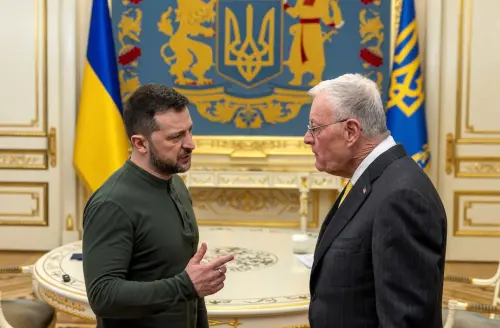On February 20th, the envoy for the Ukraine conflict met with President Volodymyr Zelenskiy in Kyiv, with no immediate updates on whether their discussions had eased the ongoing tensions between the two once staunch allies. Key U.S. officials indicated that significant frustrations persist.
Zelenskiy had initially accused Trump of echoing Russian disinformation and later adopted a conciliatory stance after Trump accused Ukraine of initiating the conflict with Russia. Trump referred to Zelenskiy as someone who needed to act swiftly to avoid losing his country.
As Trump sought to swiftly resolve the conflict, Pence suggested that engaging in dialogue with Russia was essential to halt the war. Meanwhile, U.S. National Security Advisor Mike Waltz found Zelenskiy's criticisms unacceptable and emphasized the need for the Ukrainian president to resume negotiations.
Following a meeting in Kyiv between Zelenskiy and Trump's envoy Keith Kellogg, discussions revolved around prisoners of war, security guarantees for peace agreements, and the current battlefield situation. While a joint press conference was planned but canceled at the request of the U.S., details remained scarce.
In light of White House considerations to present a revised agreement to Zelinskiy, the Ukrainian president did not address this in his social media statements. A potential meeting between Trump and Putin hinges on progress in ending the conflict in Ukraine, according to U.S. Secretary of State Marco Rubio.
European leaders responded to Trump's Ukraine stance by committing to enhancing defense spending and contemplating a European security plan for Ukraine. Macron urged Trump not to appear "weak" towards Putin, highlighting the importance of consistent policies in dealing with global powers like China.
Waltz supported European-backed security guarantees for Ukraine and advocated for NATO members to allocate at least 2% of GDP towards defense by the upcoming summit in June. The Kremlin expressed concerns over the European plan, while Zelenskiy and NATO welcomed it.
NATO Secretary-General Mark Rutte stressed the importance of preventing any further territorial encroachment by Russia into Ukraine. While Ukrainian officials fear a ceasefire might embolden Russian aggression, the head of Ukrainian military intelligence hinted at a potential truce, though its longevity remains uncertain.
Trump's assertion that Zelenskiy is a dictator stems from Ukraine's imposition of martial law, hindering the holding of elections since Russia's invasion commenced on February 24, 2022. Opposition figures in Ukraine, including Tymoshenko and Zaluzhnyi, rallied behind Zelenskiy, emphasizing the need to focus on winning the war rather than holding elections amidst the conflict.
Poroshenko, a former president at odds with Zelenskiy, refrained from contesting Trump's election assertions this time. Calls for a government of national unity and criticisms against perceived political repressions were echoed by Herashchenko, prompting Prytula to advise Ukrainians to be cautious of Trump's comments, affirming that Ukraine decides its leaders.
